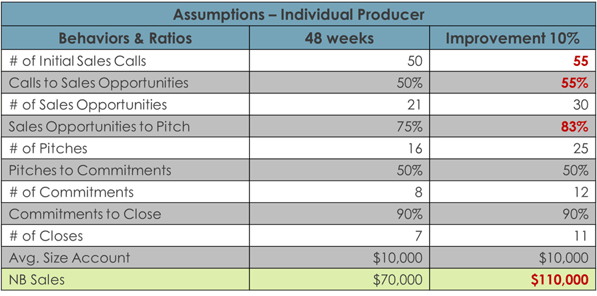Make Small Improvements to Drive Better Sales Performance
The beginning of the year is a natural time to reflect on what occurred in 2025 and to look at 2026 in terms of what your team must do to improve sales results (or, if they had a good year, what they need to do to maintain those results). As sales leader, you would be wise to remember that “what got you there won’t keep you there.”
At Anthony Cole Training Group, we have always adhered to the Japanese business principle known as “kaizen,” which translates to gradual self-improvement over time. In short, kaizen suggests that minor improvements can have a dramatic result when those changes are compounded over many years.
We know that salespeople fail for only two main reasons:
- Lack of effort
- Lack of skill
So, what would the kaizen impact look like in terms of making some improvements in your team’s sales process? What might your sales results look like if they made some changes within their skill sets to improve sales performance?
Let’s start by acknowledging what we typically hear, which is a salesperson saying that they can’t possibly work any harder. They have grown tired of their leader beating the same drum of “you need to work harder” (more effort). While that can be true for some, for most salespeople, the road to improving sales results is best traveled by taking a different route.
How Incremental Change Improves Performance
What if your salespeople committed to getting 10 percent better in just a few key areas moving forward? What would happen if, on a weekly basis, they made 10 percent more calls? Instead of making 20 calls per week, could they make 22 calls? Making 2 more calls per week will not break them. What if you worked with them to improve their discovery skills on sales calls just ever so slightly and went from finding 2 new opportunities each week to finding 3 new opportunities each week? And what if they were able to make a slight improvement in their closing skills? What if their closing percentage went from 20 percent to 25 percent?
Here’s an example of what happens if one of your producer’s improves by 10% in just three different areas of their sales process. This incremental improvement drives an additional 57% in sales!

The reality is your salespeople might not need to work any harder than they are currently working. This is not an extreme “home makeover”. Most of your people do not need that. What they do need is to find just a few areas in their sales process where they can make a slight improvement in 2026. Those changes might seem to be insignificant but your team results in 2026 will be far from that.







.jpg?width=792&name=Certificate_Tony%20Cole%20(002).jpg)

